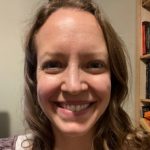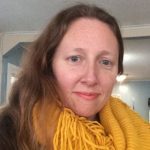
Parents
Public Dining Room
Public Dining Room
Active 2 years ago
Our walk toward our North Star begins at home. Walk here with your fellow parents. A future of… View more
Public Dining Room
Who do you follow?
-
CreatorDiscussion
-
January 27, 2021 at 1:37 pm #6445

Marlise FloresMemberHow do we apply this as parents, especially as parents of white children?
Lace: Only seemingly counter-intuitively , I absolutely endorse her assertion that people should follow and learn from and engage with more than just Black racial justice advocates and educators.
And I say this as a Black racial justice advocate and educator!
Her point is that we are found in every interest and arena.
Outside of anti-racism spaces, dear white people (all of us really; BIPOC often give short shrift *to ourselves*), who do you follow?
Do you follow black Knitters?
Or black people who love making elaborate Legos?
How about black people who have a passionate opinion on raised vegetable beds?
Who can tell you Arcane minutiae about Star Trek, the Original Series, and the Next Generation, and even *Voyager*, FFS!
How about black people who find secret meaning in Led Zeppelin lyrics?
The point is that racial Equity work does not end with racial Equity education.
If the people who influence you in ways both seemingly frivolous and deadly serious are not also Black Faces, you will be much less likely to consider a black accountant, or a black orthodontist, or black landscape architect, or a black insurance salesman who throws you into an annuity.
Seeing us fully and as multifaceted: it’s a big deal.
Make this a part of your NON-NEGOTIABLE Praxis.
https://www.instagram.com/p/CKeUjybjwxd/?igshid=kcgnzux3zgjz
-
CreatorDiscussion
-
AuthorReplies
-
January 27, 2021 at 9:34 pm #6448

Leah GalloMemberYou’ve got me thinking here. If you are talking about my personal friendships, then yes they go beyond racial justice advocates. As it relates to following on social media in a broader sense beyond friends, I do follow Black authors (outside of anti-racism) and politicians. I generally only follow friends, politicians or authors, which is making me realise I need to diversify my feed in general! As it relates specifically to my children, I do talk to them about race but try not to reduce Black people to race. I seek out Black authors for both my kids and myself that isn’t race specific material, including biographies of Black individuals to share with my 6yo. I seek out films and tv shows with BIPOC cast. I’m not sure though if this gets to the heart of what you’re asking us to examine here as it relates to children. They unfortunately don’t have a lot of interaction in the wider world at the moment. I look forward to discussing this more or hearing someone else’s thoughts to help me get on the right track with this.
-
February 4, 2021 at 11:17 am #6806

Marlise FloresOrganizerLeah, it sounds like you primarily introduce Black people who have an academic or professional expertise. What ways do you think that frames the narrative around which BIPOC to listen to?
-
-
January 30, 2021 at 10:16 am #6505

Konstanze WeltersbachMemberI do follow accounts according to my interests, and made the conscious effort to look for Black and brown people to follow. Cooking, classical Music, web comics, fiction reviews, librarians, fashion, make up artists (some things because I do them, some because their just pretty).
It’s about who I want to see, but of course I also did it for my children, who are Black. My older kid plays the flute, so I looked for Black Flutists to show her – but because of their music, I didn’t point out their race (she caught it, of course.now that she starts to use google and go on youtube by herself, she’s searching for people with different expressions of sexuality and gender, which is no surprise. The internet can be a wonderful thing). The younger kid loves watching people build Matchbox car tracks and minecraft stuff, the same there. For both of them it’s about representation.
For white Kids it would be more about deprogramming the white dominated worldview that we grow up with if we’re not careful. It might be easier when they’re young, but tv / internet isn’t enough. They have very fine senses for the differences between what we preach and how we live.
-
March 17, 2021 at 9:08 pm #8644

Shannon Brescher SheaMemberYes, I’ve tried to do this approach as well in terms of, “Oh, it’s someone talking about this thing I like and they’re not white! I’ll try it out!” I figured that I’d read new and interesting perspectives on topics I already knew about as a result and I have. As I wrote my book (parenting from the perspective of environmental sustainability), I sought out a variety of perspectives from sources for the same reason and got so many insights that I wouldn’t have had otherwise.
-
-
January 30, 2021 at 10:44 pm #6539

Rebecca McClintonMemberwhen it comes to parenting advice and approaches, I’ve received a couple trainings from BIPOC, but would love to learn who others follow, read, and learn from. I am a foster parent and for a short while followed a Black foster parenting group, but I felt like I was intruding on a lane that wasn’t mine so I left the group. The group centered around recruiting and retaining BIPOC foster families. There are so few families of color of foster, and the majority of kids in care are BIPOC (there are SO many messed up things about the system!)
I have some diversified materials (love the Black History flash cards promoted around Lace’s birthday!) and media in my home, but realized just this weekend that they are pretty geared around teens as that’s who we usually have in our home, but this weekend we’ve had a much much younger kiddo for the weekend and I realized I need to have things that span the ages just in case. Eager to learn from the rest of you!
-
February 3, 2021 at 4:49 pm #6780

Emily HolzknechtMemberI am glad you brought up parenting advice and approaches here. I think the only times I have learned about parenting from nonwhite people has been in relation to anti-racism. There have been parenting advice things I have read that purportedly been extracted from BIPOC wisdom, but I learned about them through a white person or organization, for example a Scandinavian parenting advice site for Americans promoting Inuit parenting practices because the white advice site believed those practices to be supportive of the Scandinavian parenting values of the site. You also said you felt like you were intruding on a lane that wasn’t yours, and I am thinking about that too, about how to value the knowledge of BIPOC parenting experts without then appropriating what I am gleaning and applying it in totally white ways while telling others that I’m using ____ methods as a badge of honor. Well, obviously I already have some idea how not to do that since I just typed it out. I will go back to Lace’s Kwanzaa introduction and reread that to orient myself better first.
-
February 3, 2021 at 4:52 pm #6781

Christin SpoolstraMemberWould love to hear what conclusions you reach after revisiting the Kwanza piece
-
February 6, 2021 at 12:04 pm #6867

Emily HolzknechtMemberChristin, I have come back to this post. My comments appear in my own thread rather than here though.
-
-
February 7, 2021 at 11:13 pm #6959

Jen ScaggsMemberI can also relate to your feeling of intruding on a lane that wasn’t yours. I’ve been trying to read many books from black authors and about the black experience, and often I feel awkward sharing about what I’ve read, because those books weren’t written for people like me and I almost feel like I’ve invaded their privacy, but I think it helps me to be more understanding and empathetic. I also want to connect with black people in my community in support of antiracism and in the spirit of fellowship, but feel like maybe that’s not my place and I don’t want to intrude.
That also makes me wonder if that’s how BIPOC people anytime they want to interact in a majority white space… I can see how that must be very uncomfortable.
-
March 17, 2021 at 9:10 pm #8645

Shannon Brescher SheaMemberThere are some really wonderful Black and other non-white parenting advice folks out there, especially in the positive parenting space. They often do talk about anti-racist work, but talk about a lot of other issues as well. I won’t make a specific recommendation as per the guidelines, but they are definitely out there if you look for them.
-
-
February 1, 2021 at 4:50 pm #6676

Christin SpoolstraMemberI love this post and this prompt. “If the people who influence you in ways both seemingly frivolous and deadly serious are not also Black Faces, you will be much less likely to consider a black accountant, or a black orthodontist, or black landscape architect, or a black insurance salesman who throws you into an annuity. Seeing us fully and as multifaceted: it’s a big deal.”
So what does that mean for me as the soon-to-parent of a half white American, half Khmer child being raised in Cambodia? Firstly, it means not letting my Americanness overwhelm her Khmer identity. It’s already been a point of discussion with my partner because he prefers to speak in English (to be honest, so do I), but we want to ensure that she grows up equally valuing both languages so that means that our own relational habits need to change.
It also means intentionally exposing her to different types of media: ensuring that the shows and books and toys and music that we bring into our home show all types of people. I want to be very aware of never tokenizing and never seeking relationship for the pure sake of diversity. And yet I do very much want her to grow up outside of our own bubble and to know that all people are multifaceted.
-
February 3, 2021 at 4:57 pm #6782

Emily HolzknechtMemberI am thinking about your last paragraph and navigating not objectifying people as lessons for our children while still taking responsibility for not raising them in a white supremacist bubble. I am thinking about what we have learned about how to think about financial engagement. Is money being exchanged for our own benefit (to feel good about ourselves, to get the tax benefit, to perform goodness for other white people, because we see ourselves as saviors) or because we are serving the North Star (so that we are more committed because we have skin in the game, because it is owed by us, because it is part of our praxis…)? With seeing BIPOC as three dimensional and helping our children to see BIPOC as three dimensional, we can ask similar questions. Are we doing it for the benefit of our own children? Or because we are serving the North Star? I need to flesh out my thinking here. This is my start.
-
February 4, 2021 at 5:19 pm #6821

Christin SpoolstraMemberI appreciate the framing of the North Star in this context, Emily. And also @marlise’s reminder that life is lived out in the mundane. As I’ve been seeking Black voices to include in my life, by the very nature of them being prominent on some platform for me to find, they are not mundane. But it’s so critical for me to find that – for myself and for my family. Because what strikes me a lot in reading these threads is how white people can be individuals but bipoc are representatives. But if I had more everyday Black people in my life – full, non-tokenized humans – who have been normalized as individuals… I think that would be a huge push toward seeing all people of color as individuals. It’s just… finding that without violation of the North Star, especially since I live in a town with roughly 3 Black people (one of whom is about to move)
-
-
February 4, 2021 at 11:23 am #6807

Marlise FloresOrganizerI am thinking about how quickly “lessons about Black people” turn into tokenizing and distancing. Which is why, for me, Lace’s comments hit home. We’ve talked before about how life is lived out in the mundane, and that means in the every day, I need to be aware of how much and where whiteness is reflected to my children. Black people exist everywhere, in every space. If I am only showing Black people in exemplary, academic, or professional roles, I am still reflecting a lens of whiteness via productivity/transaction/utility.
-
-
February 6, 2021 at 12:04 pm #6866

Emily HolzknechtMemberI have gone back and listened to Lace’s Kwanzaa intro again for the reminders about when that lipstick is not for you. Here is my reflection for the parents table regarding this post. (I have also commented differently on this post at other tables.) My answers here will be a bit mixed up between my as a parent and me as a preschool teacher because often those two roles overlap greatly.
In terms of supporting my own children to see Black people as three dimensional, my thinking on this began with what I had learned as a preschool teacher. I had learned to avoid tourist curriculum, where a teacher who is not of a culture acts as the expert of that culture to teach children briefly a few isolated activities of that culture while acting like this very short “visit” to the other culture is treated as if it is “all about this culture”. Examples: children are shown photographs of people in one version of that culture’s traditional clothing and told “this is how they dress”. They “learn” how to say “hello” in the language of that culture and are told this is how they talk. They are given the opportunity to try a traditional dish from that culture and are told “this is what they eat”. It is all very exoticized and othering and reinforces the colonization of other people in the sense of saying it’s okay for you to act like an expert on someone else’s culture, to take what you like from the culture and feel like a smart and worldy white person while displaying your pillaging of that culture with no regard to how you have objectified people. Little Passports World Edition is a premade tourist curriculum.
I had also learned to think about the picture books provided that show Black people. Are they all about racism? Do the ones that aren’t about racism go beyond just being about hair, sports and music, three of the areas where Black people are over represented in books, pushing children’s expectations for what Black people can be into those three categories?
More recently I also learned about curriculum violence and evaluating curriculum and books in terms of the amount of time spent on discrimination. Curriculum violence is generally talked about in terms of the children who are directly harmed by the violence, so Black children being asked to dramatize picking cotton in class, but also more subtle things like what percentage of the books about Black people show violence towards Black people and what percentage of an individual book shows violence towards Black people. Starting point for evaluation, although this is not set in stone and judgement still has to be used to assess violence further is 80% violence free, 20% “violence” meaning like discrimination shown and overcoming adversity. So with trans picture books for my trans child, for example, ideally 80% of the books we read about trans people would show no discrimination against trans people. They would just feature trans characters being their three dimensional selves without anti-trans adversity. The other 20% could show anti-trans discrimination and overcoming it, but within each of those books, the 80-20 ratio should still hold. 80% of the book should be free of discimination. (I’ll just say here that from what I have found 90+% of picture books with trans characters show violence towards trans people. Now that we are moving into middle childhood books I am finding more books at that level with trans characters that are not about trans-ness and therefore almost always include anti-trans discrimination as part of transness.)
Pivoting back to my white kids and seeing Black people as 3D, while they don’t experience anti-Black curriculum violence the same way that Black children would, I think having white children see Black people as 3 dimensional also requires us to consider the ratios of what we are showing white children. Are we preparing them to be consumers of trauma porn? Are we setting up expectations that this is the way it will always be for Black people, that it’s some characteristic inborn to Black people that they experience the world this way rather than emphasizing that white people are the actual problem? I have found it helpful to buy children’s books that are by Black authors and that have only Black characters in them. Those books both show Black people with much greater 3 dimensionality and also are free of anti-Black discrimination to balance out the biographies etc that do show anti-Black discrimination.
From my time here at Lace on Race and rewatching the Kwanzaa intro, I realize that previously – and I think it is likely that most white parents do this – I have shared books and other media with my children in a way that pushes them towards white saviorism even while being aware of white saviorism and hoping not to do that very thing. I did seek out books (etc) where Black people save themselves, but I think even then I have been too solution oriented. I have begun to be more nuanced and try new approaches to interacting with these materials with my children, approaching them with a greater sense of humility as Lace says. I will be sure to always model finding myself in the oppressor, not just being solution focussed. I will speak overtly about this lipstick is not for you, so that my white children can learn the lesson that they have no right to be the uberconsumers.
-
February 6, 2021 at 6:10 pm #6886

Christin SpoolstraMemberThis is the first time I’ve heard the concept of tourist curriculum but it makes sense to me. That said, I’m clenching a bit so am hoping you all can help me sort through this. I grew up in a very homogenous environment (Indiana) where I didn’t get exposure to other cultures except through these quick and dirty and problematic tourist curriculum pieces. So I suppose my clench is around is problematic exposure worse than no exposure at all?
This also touches on what I was struggling with in my original comment with how to seek out voices while not tokenizing. And I know there’s no clear cut answer and that it will require constant analysis and checking of the North Star and remembering that the lipstick is not for me. Just something that’s been on my mind for a few days with this Who Do You Follow post
(And, thanks, Emily, for diving back into the Kwanza piece and pulling all of this out!)
-
February 9, 2021 at 11:14 am #7005

Emily HolzknechtMemberIs problematic exposure worse than no exposure at all? I am thinking yes, it is worse because there is very little learning happening about other cultures, but a lot of whiteness being modeled. A belief behind tourist curriculum being pushed as a way to combat discrimination is that lack of exposure to other cultures is the cause of discrimination. Clearly the response is under a post about seeing Black people as three dimensional, advocating that expanding our exposure to Black people is an essential part of lessening and mitigating harm to Black people perpetuated by white people like me and by white supremacy. It is not the only part though, right? This is one post among many many others where Lace is asking us to confront and analyze our whiteness and where our whiteness shows up. Tourist curriculum involves no examination of whiteness. If we LOR walkers only did the “follow Black people outside of anti-racism spheres” part without the larger context of examining our whiteness, we would likely do it in ways that are harmful such as exploiting their labor, appropriating lipstick that is not for us and more. Tourist curriculum is less about learning about other cultures and more about learning whiteness…not examining and confronting whiteness, but learning how to approach other cultures in white, harmful ways.
Now let’s ask a different question. In a homogenous environment such as Indiana, are problematic exposure and no exposure the only two options? (Obviously as a student your only option was problematic exposure, but thinking bigger here as white parents/teachers in homogenous areas.)
A large part of the problem with tourist curriculum is the attitude of the teacher (or parent, the adult) as expert on other people’s cultures. White adults have a belief that hierarchy and experts are needed in order for learning to occur, the belief that the teacher/adult is someone who already holds knowledge and the children are people who do not have knowledge and need someone else, an expert/an adult, to give them that knowledge. It’s related to white people’s love of clean and tidy binaries with no grey areas as well as white people’s love of paternalism. White education also tends to value broad and shallow education over deep focused education especially for little kids. We tend to think it is better to touch on a ton of stuff poorly rather than stick with one thing and learn it well while developing deep thinking skills in the context of that one thing, skills that can be applied elsewhere.
If we look at Lace on Race though, that’s not how learning works. Lace on Race’s mission is to be a teaching/learning space, but in order to meet the mission, much teaching/learning occurs. Yes, Lace is an expert on racism. She is also an expert on constructing learning environments that are not dependent on her transferring directly the knowledge in her brain into our brains. She creates learning environments where we are provoked to stretch our brains and our understanding in ways we never have before. She creates environments where we construct our own knowledge and support each other in the construction of knowledge in a guided, carefully crafted way. The learning that we do is based in humility and teachability, based in never completing/being forever ongoing, based on us looking for what we don’t know yet and what better questions we should be asking ourselves. Lace has also said that she learns from engaging with Lace on Race too.
Additionally Lace has talked about how at Lace on Race she is mentoring mentors, leading leaders… She is not giving us a fish. She is teaching us to fish. The tourist curriculum is not about thinking. It is not about going deep. It is about memorizing shallow 2 dimensional info, the giving of fish, not the fishing. It is about practicing engaging in other cultures with whiteness instead of with respect. The white women Lace is mentoring will never be experts on racism the way that Lace, a Black woman, is an expert on racism. That does not excuse us from the work. We can learn to be mentors and leaders if our mentoring and leading is also based in humility and teachability, based on seeing ourselves as incomplete and our learning as forever ongoing, based on looking for what we don’t know yet and what better questions we should be asking ourselves. When we are mentors and leaders for our children, we can make sure their learning has this same basis.
What might that look like when parenting little ones? In addition to materials choice which I mentioned in my earlier comment, this could mean interacting with something like a picture book in a way that emphasizes the enormity of what is still not known to both adult and child and what is not for us. So instead of “This is what Chinese people wear.” a statement based on assumed expertise and lack of nuance, we could ask “Do you think all Chinese people wear clothes like this? Do you think these Chinese people wear clothes like this all the time?” and facilitate a thinking conversation, bringing in examples from the child’s actual experience with the culture or cultures they do have experience with that helps them form three dimensional thoughts about others based on humility and teachability rather than “expertise”. “Remember that photo of our family all dressed for Easter Sunday? I wonder if someone from another culture saw that, what would they think about us? Might they think we dress like that all the time?” Does this make sense as an alternative to problematic exposure vs no exposure?
-
February 12, 2021 at 7:15 pm #7177

Christin SpoolstraMemberThanks for this – I think my unfamiliarity with the term tourist curriculum made me miss the key point about top-down knowledge giving and how that perpetuates white framing. As I was reading through your response I was thinking about the transition of classroom to parenting so I really loved seeing your last paragraph. That idea of asking questions, reframing (especially the Easter photo), and knowledge/understanding being an evergoing quest is exactly where my head was going when you were talking about the deep rooted issues with tourist curriculum. Modeling for my child that I don’t know everything but want to know better (and then do better) is what I’m striving to be as a parent.
-
-
March 17, 2021 at 9:18 pm #8646

Shannon Brescher SheaMemberOne way that I think is helpful to avoid “tourist curriculums” is to emphasize “own voices” work in both literature and in-person presentations. “Own voices” means that the author of the work is from that race or culture that the book focuses on. As a result, they’re more likely to portray the racial experience or culture more accurately and less stereotypically. They’re also more likely to show a lot more nuance and not focus on trauma unduly.
<font face=”inherit”>In terms of in-person presentations, you don’t want the single person to come and make a presentation about “their culture” and then leave. That’s not as bad as the “top-down” aspect of the teacher doing it, but it’s still too one-and-done. But our co-op preschool had regular “culture days” where parents would put on a little presentation for the kids about their culture. We have a big immigrant population from a lot of different places around the world (including Europeans), so it wasn’t like a few people were getting singled out. I think it was fundamentally different </font>from the tourism part because they were people who the kids knew (all of the adults volunteered in the classroom at some point) and it was seen as everyone sharing with each other.
-
-
February 7, 2021 at 11:01 pm #6958

Jen ScaggsMemberI love this reminder. Personally, I don’t really feel like I follow many pages for recreation, but it’s mostly things I want to learn more about like anti-racism, homeschooling tips and speech therapy ideas. I know I follow a couple of black people in my homeschooling and speech therapy spaces, but I should take a look and see if I can find more.
For my kids, I try to incorporate books, poetry, songs from other cultures, including black authors. My son loves reading black American folktales by Virginia Hamilton!
-
February 27, 2021 at 12:37 am #8195

Rebecca McClintonMemberI recently starting listening to an audiobook by a Black author who’s an adoptive mother. She described looking for books by other Black mothers when she became one, and finding walls of books by white women about motherhood and all it’s adventures and very few by Black women, particularly Black adoptive women. I’m only part way through the audio book, but have learned a lot from it about how adoption is addressed within the Black community without the state/foster systems, and how parenting is another appropriated space where white women have taken over as ‘experts’.
-
February 28, 2021 at 10:39 pm #8265

Jen ScaggsMemberYes, I read that book too! It is amazing all of the things that we as white people don’t even have to consider. I’ve heard a lot about representation in picture books and media for kids, but I had never thought about representation in adult materials until I read her book.
-
-
March 17, 2021 at 9:34 pm #8647

Shannon Brescher SheaMemberI’m not going to give specific folks because of the guidelines. But I have been able to find BIPOC commentators in parenting, science-fiction pop culture commentary, climate change / environmental activism (where it’s especially important because of the intersectional aspects), gardening, Neurodiversity, and biking. Some of these groups may not look very diverse to white people on first glance, but that’s often because white people have forced non-white people out of them. That doesn’t mean BIPOC interested in those things don’t exist.
-
AuthorReplies
Log in to reply.